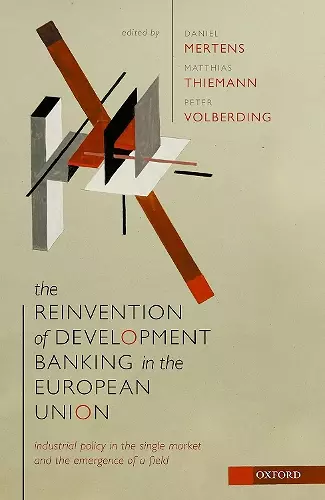The Reinvention of Development Banking in the European Union
Industrial Policy in the Single Market and the Emergence of a Field
Peter Volberding editor Daniel Mertens editor Matthias Thiemann editor
Format:Hardback
Publisher:Oxford University Press
Published:9th Feb '21
Currently unavailable, and unfortunately no date known when it will be back

National development banks (NDBs) have transformed from outdated relics of national industrial policy to central pillars of the European Union's economic project. This trend, which accelerated after the Financial Crisis of 2007, has led to a proliferation of NDBs with an expanded size and scope. However, it is surprising that the EU -- which has championed market-oriented governance and strict competition policy -- has actually advocated for an expansion of NDBs. This book therefore asks, Why has the EU supported an increased role for NDBs, and how can we understand the dynamics between NDBs and European incentives and constraints? To answer these questions, the contributing authors analyze the formation and evolution of a field of development banking within the EU, identifying a new field around an innovative conceptualization of state-backed financing for the purposes of policy implementation. Yet rather than focusing solely on national development banks, the authors instead broaden the focus to the entire ecosystem of the field of development banking, which includes political institutions (both in Brussels and in the member states), financing vehicles (such as the Juncker Plan), regulatory bodies (Directorate-General for Competition, Directorate-General for Economic and Financial Affairs), and commercial actors. Seven in-depth case studies on European NDBs, along with three chapters on European-level actors, detail this field of development banking, and answer the questions of when, where, and how development banking occurs within the EU.
This timely and innovative contribution explains the new ways in which European authorities, at both national and supranational levels, seek to exploit a renewed focus on development banking to advance critical economic and political goals. The volume shows that tensions abound, strategies differ, and the fight over rules is far from settled. The authors here provide a comprehensive account of development banking's evolution in Europe, while also distilling a number of new and very surprising findings about the engines of change. The study thus explains development banking's new role and power, but also attunes us to the larger phenomenon of capitalism's transformation over time. * Rachel A. Epstein, Professor of International Relations and European Politics at the Josef Korbel School of International Studies, University of Denver *
Finance is not neutral. The type of finance determines how growth in the real economy is structured. This book is an important contribution, advancing our understanding of this relationship and hence how finance is shaped and can be shaped to deliver long-run development and growth trajectories in Europe. It provides a rich history of the different evolutions, trajectories, and institutional setups of national development banks while also uncovering key lessons about instruments, structures, and levels of coordination across policy spheres. This is a valuable reading for anyone interested in the political economy of development banking and the various roles that development banks and institutions can play to deliver economic goals. * Mariana Mazzucato, Professor in the Economics of Innovation and Public Value at University College London and Founding Director of the Institute for Innovation and Public Purpose (IIPP) *
ISBN: 9780198859703
Dimensions: 240mm x 160mm x 26mm
Weight: 674g
354 pages